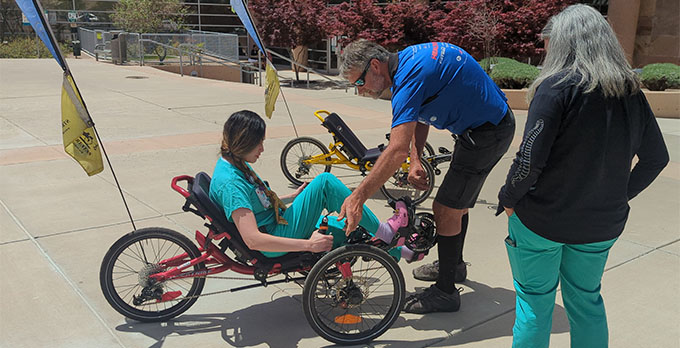UNM Health is home to the most sophisticated stroke program in New Mexico. Our award-winning team treats nearly 800 patients each year, providing exceptional care and an intensive and immersive learning environment for trainees.
But some of our most important work happens beyond the hospital and clinics. An important part of our mission is going into our communities to get the word out about stroke symptoms, prevention and survivorship.
A significant part of New Mexico’s population has limited access to healthcare. For some, it’s geographic—the closest stroke center could be hours away. Even in our urban and suburban neighborhoods, those at the highest risk for stroke may be reluctant to seek care because they’re uninsured or underinsured.
There are two things we want everyone in our communities to know about stroke:
- Time is of the essence: The earlier we can provide care, the better the outcome can be.
- No one is alone: You won’t be a burden by asking for help, and resources are out there no matter what your situation.
The UNM Health Stroke Team partners with organizations and individuals across the state to engage with our communities. You’ll find us at traditional outreach activities such as support groups and health fairs. We’re also expanding our reach with special events, targeted programming, and collaborations with emergency service agencies.
Retreat & Refresh Stroke Camp
One of our newest events is the Retreat & Refresh Stroke Camp for survivors and caregivers. This collaboration with United Stroke Alliance and the UNM Brain Crew is a weekend getaway that offers a supportive environment focused on education, socialization, and relaxation.
The retreats, held in September at Glorieta Adventure Camps, give families the opportunity to connect with other members of the stroke community. Survivors talk through their post-stroke recovery and rehabilitation, while caregivers are encouraged to share their own unique challenges.
Volunteers from UNM Health lead activities like hiking and ziplining that are adapted to accommodate stroke impairments. Our healthcare providers also offer one-on-one guidance for daily routines like medications, blood pressure checks, and safe ambulation. Our third stroke camp last fall was a huge success, and planning is underway for the fall 2025 retreat.
Related reading: Stroke survivors enjoy summer camp experience thanks to UNM partnership
Hope In Crisis Support Group
In 2023, a TV news story led stroke survivor Ian Mackaness and his wife, Stephanie Lopez, to launch a new group called “Hope in Crisis: Healing Through Community.”
In less than a year, Hope in Crisis grew to more than 45 active participants . They work closely with UNM Health’s Felicia McDermott, RN, to arrange speakers, presentations, and awareness activities.
The Hope in Crisis group meets on Tuesdays at 6 p.m. at North Domingo Baca Multigenerational Center.
Stroke Awareness Month: Spokes Fighting Strokes
May is National Stroke Awareness Month, and the UNM Stroke Team is on the front lines of local events.
One of our favorites is Dan Zimmerman’s Spokes Fighting Strokes clinics. Dan is a stroke survivor who tours the country on his recumbent bike, and we’re honored to host the first stop of his annual trek. Dan teaches fellow survivors and their caregivers about regaining strength and freedom, highlighted by his popular clinics on adaptive cycling.
The next Spokes Fighting Strokes tour stop in Albuquerque will be April 18-28, 2025.
Youth Education on Stroke (YES)
Another new collaboration with United Stroke Alliance, Youth Education on Stroke is geared toward children in the fifth grade. It includes education on recognizing stroke symptoms, getting emergency care, and understanding the process of stroke recovery.
We work with 10- and 11-year-olds because many kids in our region grow up multigenerational households. They’re living with their grandparents or even great-grandparents who may be at risk of stroke or stroke survivors, so it’s important for kids to have good information.
In addition to our presentation, children speak first-hand with a stroke survivor and participate in activities that simulate sensory and mobility impairments.
Other Community Connections
Our Stroke Team also works closely with Albuquerque Fire & Rescue’s Home Engagement Alternative Response Team (HEART) initiative. This program started in 2018 to reduce the number of non-emergency calls to 911. It’s since expanded into a valuable service for our most vulnerable residents.
HEART sends specially trained paramedics who are certified in public health into homes to assess health conditions, safety concerns, and mobility issues. Along the way, they connect their constituents with services they might not have gotten any other way.
If an individual is showing signs of stroke-related symptoms, or struggling to recover from a stroke, HEART coordinates with the UNM Stroke Team for assessment, risk reduction, and follow-up care.
Volunteer Opportunities
Help is always welcome at any of the events the UNM Stroke Team coordinates or supports. Volunteer spots can fill up quickly for our most popular events like Stroke Camp, so be sure to get your name in as early as possible.
To volunteer for a specific community event or a list of all upcoming outreach and engagement activities, email Felicia McDermott, RN

